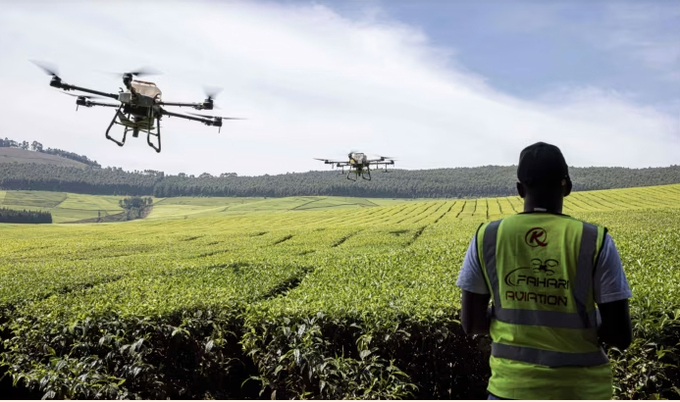May 28, 2025 | 11:48 GMT +7
May 28, 2025 | 11:48 GMT +7
Hotline: 0913.378.918
May 28, 2025 | 11:48 GMT +7
Hotline: 0913.378.918

Unmanned aerial vehicles spread fertiliser at Kipkebe Tea Estate in Kenya in 2022. Since the 1960s, new seed varieties and improved access to fertilisers have helped transform agricultural production across the world. Photo: Patrick Meinhardt/AFP/Getty Images
An hour away from the medina of Marrakech and its throngs of tourists, plains of semi-desert stretch across the horizon. Here, at the Benguerir mine, huge diggers bore into the ochre earth to reach the phosphate rock beneath, a resource that could help shape Africa’s future.
OCP, a state-owned Moroccan company, digs 44mn tonnes of phosphate rock out of Benguerir and three other mines each year for processing into fertiliser. By 2027, that will reach 70mn tonnes. While most of its output is currently shipped outside the continent, it is on Africa that the company is pinning its future.
The company is pouring cash into developing the continent’s agrifood sector, investment that it hopes will result in a big increase in demand for fertiliser. It is a massive gamble given that Africa had to import $43bn of food in 2019, according to World Bank estimates. That figure is set to rise to $110bn by 2025, it predicts.
The continent’s agriculture is generally inefficient; average yields from cereals are half those of India and a fifth of those of the US. Political insecurity, poor infrastructure and conflict scare off investors and the challenges of climate change are particularly acute.
But OCP is not alone in reckoning that Africa can produce enough food to sustain itself and perhaps even supply other parts of the world. The UN forecasts a global population of 10bn people by 2050 will require 60 per cent more calories.
“Africa can be a net food exporter,” Bill Gates tells the Financial Times. “Even in the face of climate change.” The Microsoft co-founder, whose charitable foundation is investing across the continent, says better seeds and better livestock genetics could have a big impact. “That plus fertiliser — that’s the green revolution.”
Since the 1960s, new seed varieties and improved access to fertilisers have helped transform agricultural production across many parts of the world. In Asia, for example, rice yields doubled between 1965 and 1995.
Africa was left almost untouched by this agricultural revolution, held back in part by too few people to farm its abundant land. Today, the continent has 60 per cent of the world’s available arable land and a growing young population to work it.
For OCP, a company whose strategy often overlaps with Morocco’s diplomatic agenda in Africa, the rewards could be huge. The continent uses 24kg of fertiliser per hectare of land on average, according to the FAO, a fifth of the global average. “To put it simply, yields are maybe a quarter of their potential today, across the board in Africa,” says Ilias El Fali, OCP’s managing director for corporate strategy, performance management and operations co-ordination. “If we manage to bring them closer to their potential, we can create a lot of value.”
To raise those yields, he estimates that Africa will need to consume 10 times as much fertiliser. If it can do so, El Fali and OCP believe Africa can “really become the breadbasket of the world, not only to ensure its own food security, but also to contribute to relieving the global food security challenge.”
It is an enormous task, says David Laborde, director of agrifood economics at the UN’s Food and Agriculture Organization (FAO). “For the future of the world, we need to see a transformation in Africa like we have seen in Latin America,” he adds. He predicts it will be a slow process. “Investing in Africa today is both more risky politically and in terms of the climate.”
(FT)

(VAN) Vikas Rambal has quietly built a $5 billion business empire in manufacturing, property and solar, and catapulted onto the Rich List.

(VAN) Available cropland now at less than five percent, according to latest geospatial assessment from FAO and UNOSAT.

(VAN) Alt Carbon has raised $12 million in a seed round as it plans to scale its carbon dioxide removal work in the South Asian nation.

(VAN) Attempts to bring down the price of the Japanese staple have had little effect amid a cost-of-living crisis.

(VAN) Fourth most important food crop in peril as Latin America and Caribbean suffer from slow-onset climate disaster.

(VAN) Shifting market dynamics and the noise around new legislation has propelled Trouw Nutrition’s research around early life nutrition in poultry. Today, it continues to be a key area of research.

(VAN) India is concerned about its food security and the livelihoods of its farmers if more US food imports are allowed.